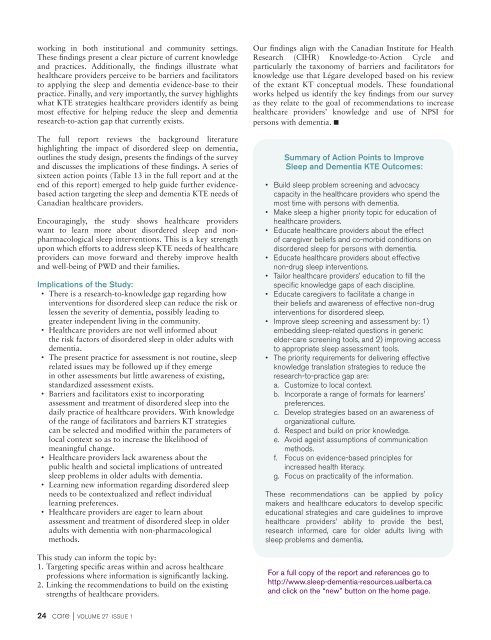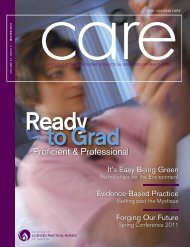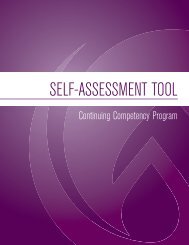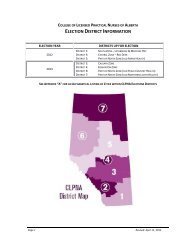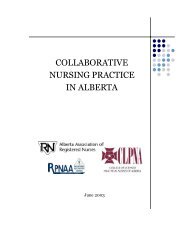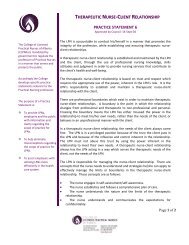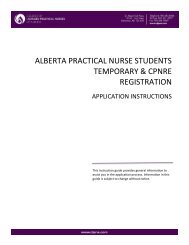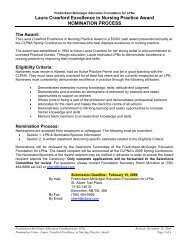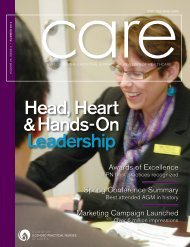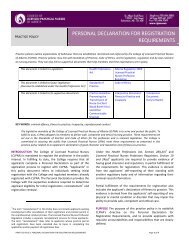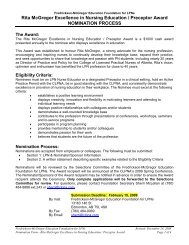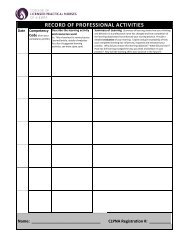Download PDF - College of Licensed Practical Nurses of Alberta
Download PDF - College of Licensed Practical Nurses of Alberta
Download PDF - College of Licensed Practical Nurses of Alberta
- No tags were found...
Create successful ePaper yourself
Turn your PDF publications into a flip-book with our unique Google optimized e-Paper software.
working in both institutional and community settings.These findings present a clear picture <strong>of</strong> current knowledgeand practices. Additionally, the findings illustrate whathealthcare providers perceive to be barriers and facilitatorsto applying the sleep and dementia evidence-base to theirpractice. Finally, and very importantly, the survey highlightswhat KTE strategies healthcare providers identify as beingmost effective for helping reduce the sleep and dementiaresearch-to-action gap that currently exists.The full report reviews the background literaturehighlighting the impact <strong>of</strong> disordered sleep on dementia,outlines the study design, presents the findings <strong>of</strong> the surveyand discusses the implications <strong>of</strong> these findings. A series <strong>of</strong>sixteen action points (Table 13 in the full report and at theend <strong>of</strong> this report) emerged to help guide further evidencebasedaction targeting the sleep and dementia KTE needs <strong>of</strong>Canadian healthcare providers.Encouragingly, the study shows healthcare providerswant to learn more about disordered sleep and nonpharmacologicalsleep interventions. This is a key strengthupon which efforts to address sleep KTE needs <strong>of</strong> healthcareproviders can move forward and thereby improve healthand well-being <strong>of</strong> PWD and their families.Implications <strong>of</strong> the Study:• There is a research-to-knowledge gap regarding howinterventions for disordered sleep can reduce the risk orlessen the severity <strong>of</strong> dementia, possibly leading togreater independent living in the community.• Healthcare providers are not well informed aboutthe risk factors <strong>of</strong> disordered sleep in older adults withdementia.• The present practice for assessment is not routine, sleeprelated issues may be followed up if they emergein other assessments but little awareness <strong>of</strong> existing,standardized assessment exists.• Barriers and facilitators exist to incorporatingassessment and treatment <strong>of</strong> disordered sleep into thedaily practice <strong>of</strong> healthcare providers. With knowledge<strong>of</strong> the range <strong>of</strong> facilitators and barriers KT strategiescan be selected and modified within the parameters <strong>of</strong>local context so as to increase the likelihood <strong>of</strong>meaningful change.• Healthcare providers lack awareness about thepublic health and societal implications <strong>of</strong> untreatedsleep problems in older adults with dementia.• Learning new information regarding disordered sleepneeds to be contextualized and reflect individuallearning preferences.• Healthcare providers are eager to learn aboutassessment and treatment <strong>of</strong> disordered sleep in olderadults with dementia with non-pharmacologicalmethods.This study can inform the topic by:1. Targeting specific areas within and across healthcarepr<strong>of</strong>essions where information is significantly lacking.2. Linking the recommendations to build on the existingstrengths <strong>of</strong> healthcare providers.Our findings align with the Canadian Institute for HealthResearch (CIHR) Knowledge-to-Action Cycle andparticularly the taxonomy <strong>of</strong> barriers and facilitators forknowledge use that Légare developed based on his review<strong>of</strong> the extant KT conceptual models. These foundationalworks helped us identify the key findings from our surveyas they relate to the goal <strong>of</strong> recommendations to increasehealthcare providers’ knowledge and use <strong>of</strong> NPSI forpersons with dementia. nSummary <strong>of</strong> Action Points to ImproveSleep and Dementia KTE Outcomes:• Build sleep problem screening and advocacycapacity in the healthcare providers who spend themost time with persons with dementia.• Make sleep a higher priority topic for education <strong>of</strong>healthcare providers.• Educate healthcare providers about the effect<strong>of</strong> caregiver beliefs and co-morbid conditions ondisordered sleep for persons with dementia.• Educate healthcare providers about effectivenon-drug sleep interventions.• Tailor healthcare providers’ education to fill thespecific knowledge gaps <strong>of</strong> each discipline.• Educate caregivers to facilitate a change intheir beliefs and awareness <strong>of</strong> effective non-druginterventions for disordered sleep.• Improve sleep screening and assessment by: 1)embedding sleep-related questions in genericelder-care screening tools, and 2) improving accessto appropriate sleep assessment tools.• The priority requirements for delivering effectiveknowledge translation strategies to reduce theresearch-to-practice gap are:a. Customize to local context.b. Incorporate a range <strong>of</strong> formats for learners’preferences.c. Develop strategies based on an awareness <strong>of</strong>organizational culture.d. Respect and build on prior knowledge.e. Avoid ageist assumptions <strong>of</strong> communicationmethods.f. Focus on evidence-based principles forincreased health literacy.g. Focus on practicality <strong>of</strong> the information.These recommendations can be applied by policymakers and healthcare educators to develop specificeducational strategies and care guidelines to improvehealthcare providers’ ability to provide the best,research informed, care for older adults living withsleep problems and dementia.For a full copy <strong>of</strong> the report and references go tohttp://www.sleep-dementia-resources.ualberta.caand click on the “new” button on the home page.24 care | volume 27 issue 1


